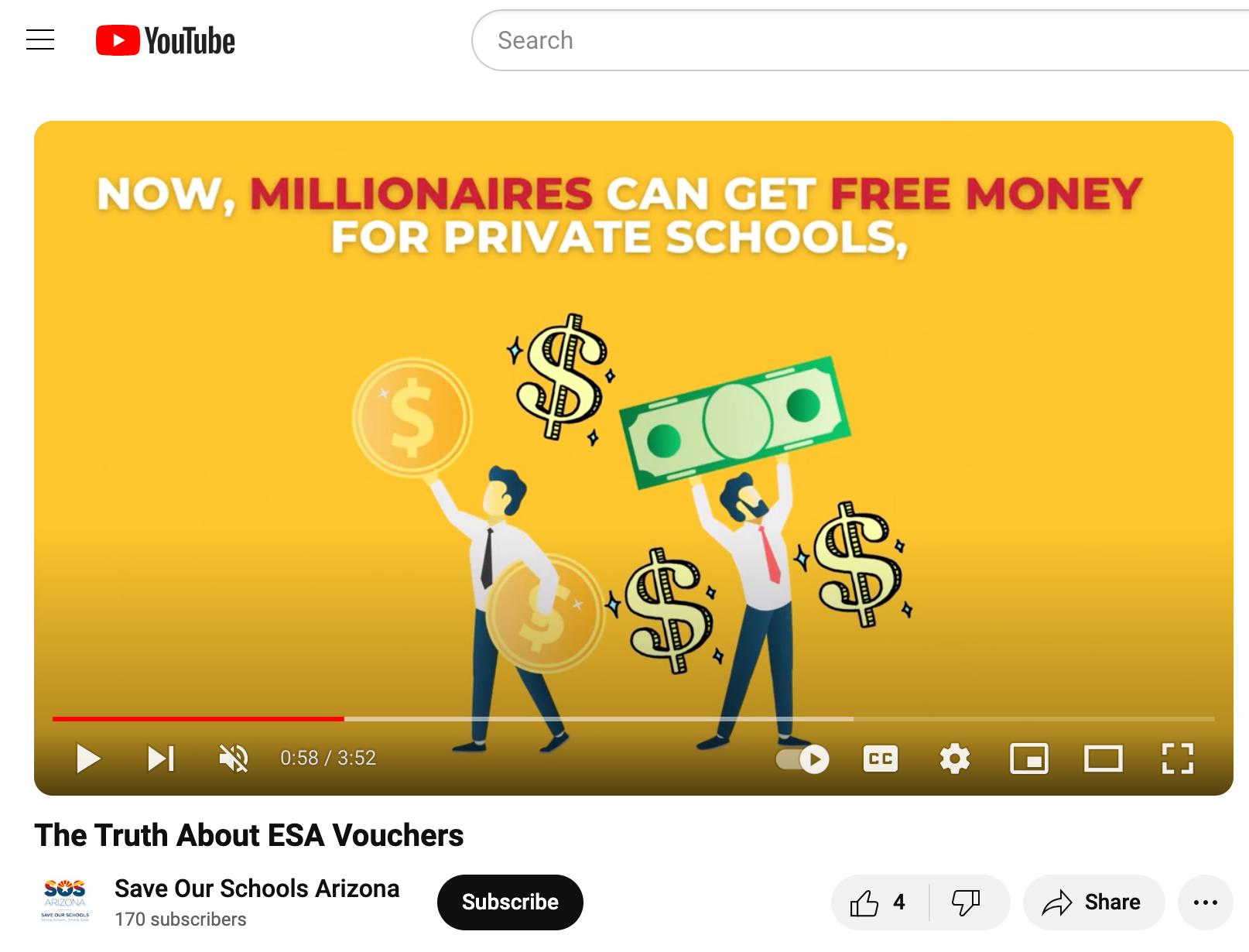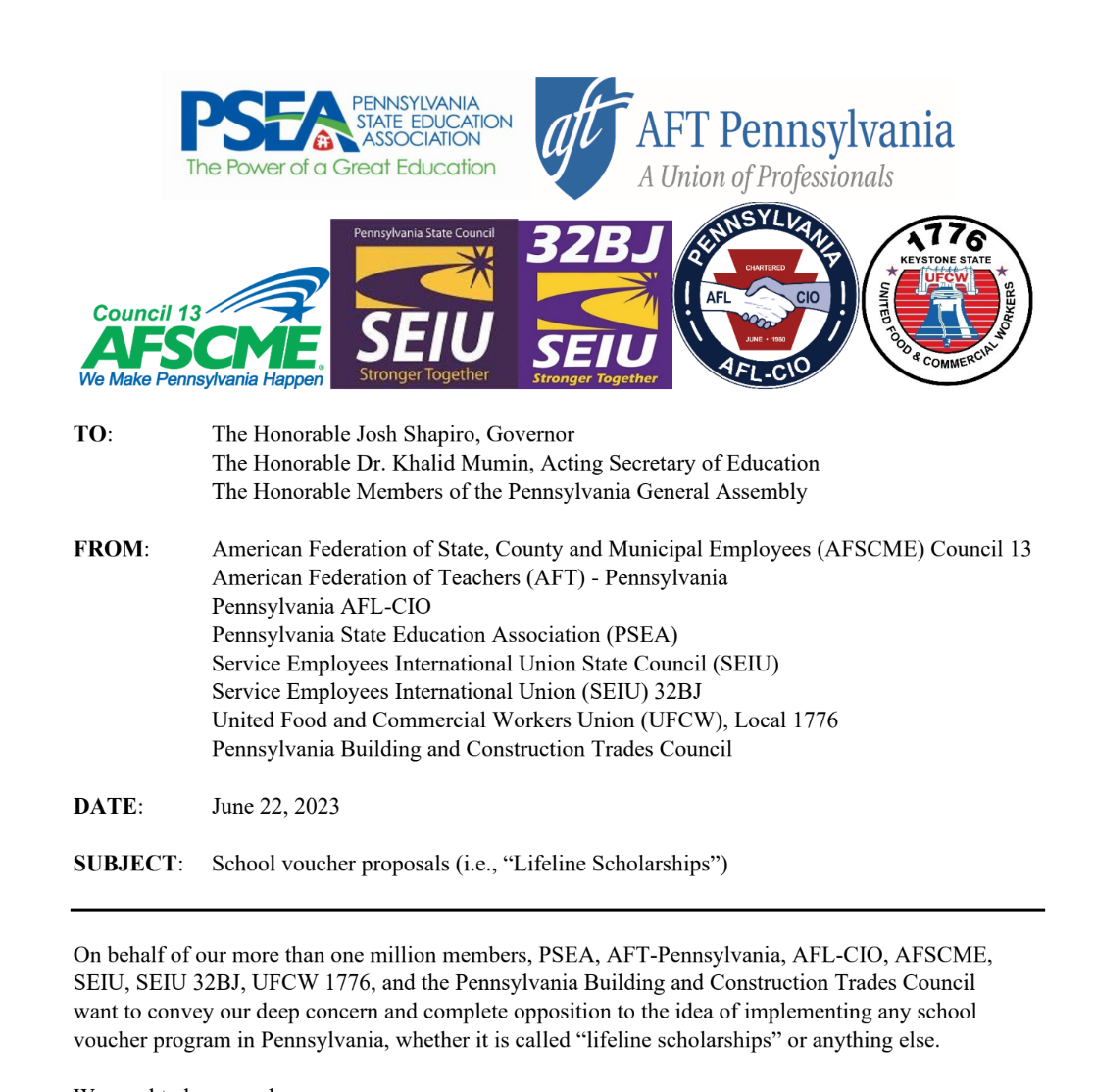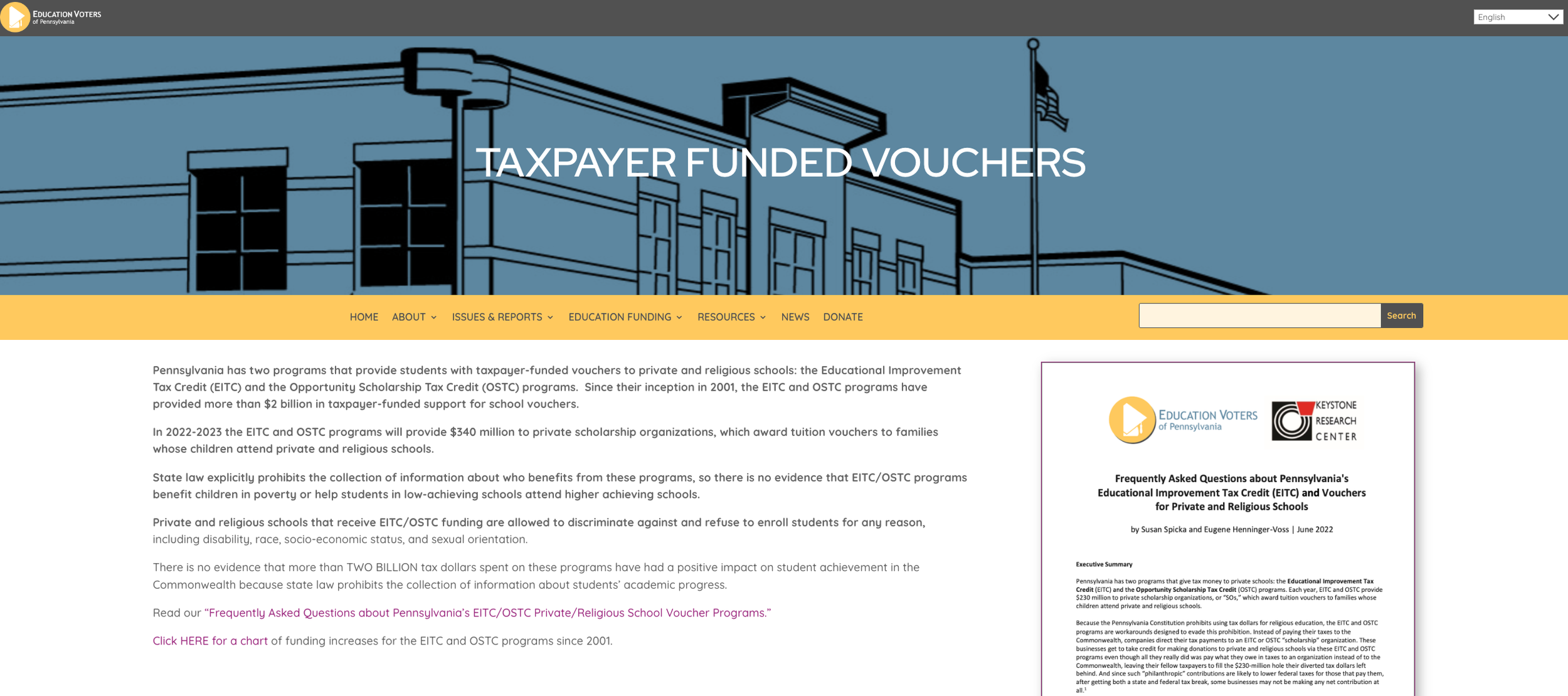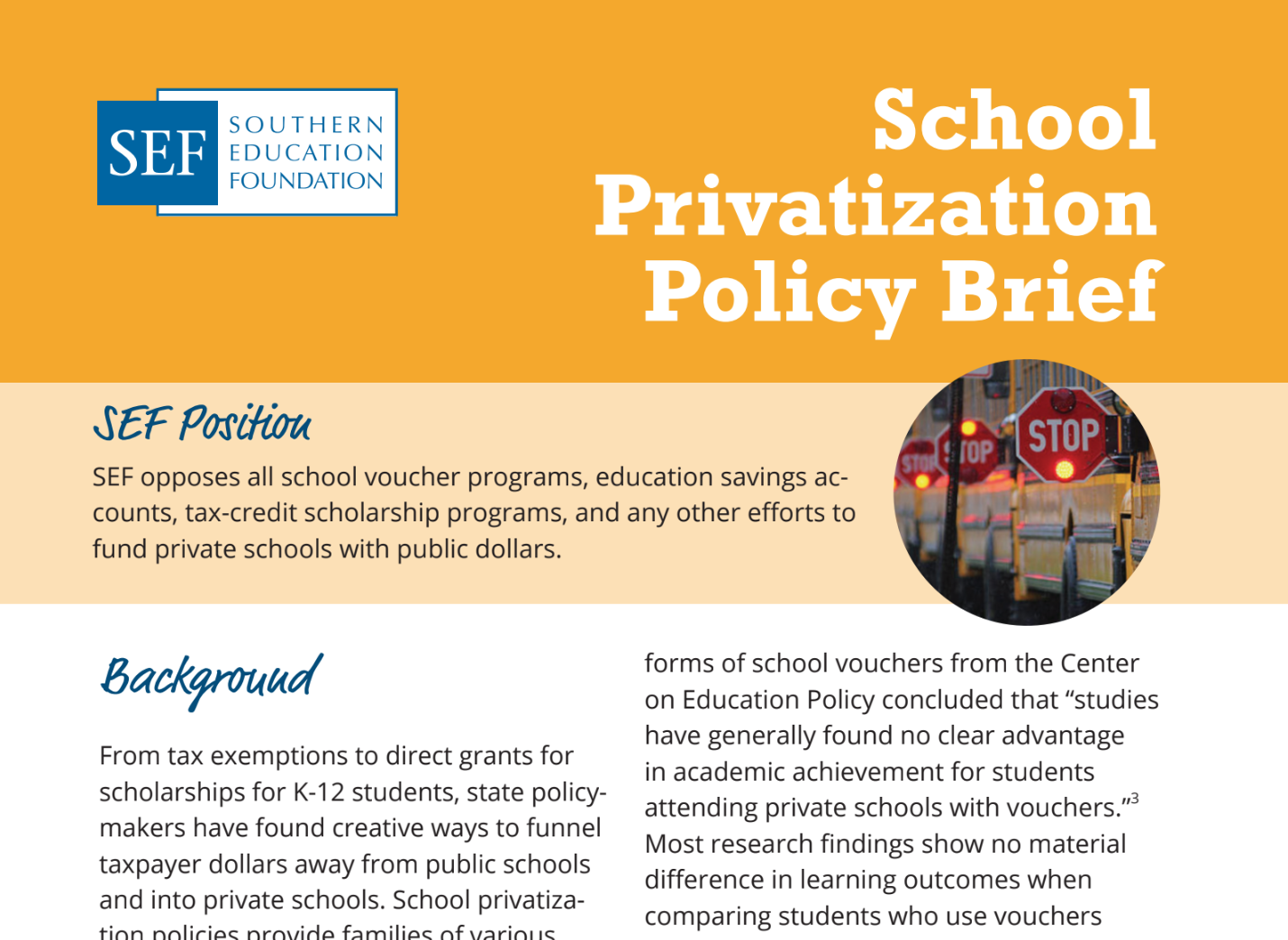ALL RESOURCES
FILTER BY TAG
Select a tag
- Academic performance
- Accessibility
- Accountability
- Advocacy
- Advocates
- Article
- Bill analysis
- Bill tracker
- Billionaires
- Blog post
- Civil rights
- Coalition building
- Community Schools
- Cost impact analysis
- Dark Money
- Data
- Disability
- Discrimination
- Drain funds from public education
- Education Savings Account (ESA)
- English language learners
- Fact sheet
- Fraud Waste and Abuse
- Graphic
- History
- Indigenous and Native Education
- Integration
- LGBTQ+
- Legislation
- Letter
- Litigation
- Messaging or talking points
- Model legislation
- National Voucher
- News
- Parents
- Personal narrative
- Podcast
- Policy brief
- Policymakers
- Radio
- Referendum
- Religion
- Report
- Rural communities
- Segregation
- Separation of church and state
- Slide deck
- Slides
- State Constitutional Right to Education
FILTER BY AUTHOR
Select an author
- Aaron Sanderford
- Alec MacGillis
- Allen Pratt
- Associated Press
- Bob Peterson
- Bruce Schreiner
- Catherine Caruso
- David Montgomery
- David Pepper
- Eli Hager
- Emily Walkenhorst
- Ethan Dewitt
- Geoff Mulvihill
- Hilary Wething
- Howard Fischer
- Jason Bailey
- Jessica Corbett
- Jim Collier
- Joe Dana
- Joshua Cowen
- Juan Perez Jr.
- Kiera Butler
- Laura Pappano
- Liam Amick
- Maurice Cunnningham
- Nora De La Cour
- Paige Masten
- Patrick Darrington
- Paul Hammel
- Phil Williams
- Rob Boston
- Robert Huber
- Rowan Moore Geretsy
- Sasha Pudelski

State lawmakers pass updated ‘Opportunity Scholarship’ bill
LINCOLN — Nebraska lawmakers gave final approval Thursday to an updated bill that will devote $10 million a year in state funds for scholarships to attend K-12 private or parochial schools.

The Impacts of Universal ESA Vouchers: Arizona’s Cautionary Tale
Last year, Arizona lawmakers enacted universal Empowerment Scholarship Account (ESA) vouchers by a razor-thin margin, after voters overwhelmingly rejected the plan in 2018. On September 30, 2022, all students in Arizona became eligible for private school vouchers. One year into this failed experiment, the out-of-control growth of Arizona's ESA voucher program spells economic crisis for the state, as well as the public schools that 92% of Arizona families choose.

In Nebraska, The Fate Of A New Voucher Program May Be Decided At Ballot Box
On May 30, Nebraska’s Governor Jim Pillen signed into law LB 753, creating tax credit vouchers for subsidizing private schools.

The State of Education Savings Account Programs in the United States
Education Savings Accounts are a new form of private school choice and are arguably the most strongly promoted approach by voucher advocates. This policy brief examines the emerging policy, considering how it mirrors and differs from conventional voucher ap- proaches and examining the legal issues that it raises.

Mississippi Voucher ESA Program
The Equal Opportunity for Students with Special Needs Act became law in 2015, establishing Education Scholarship Accounts (ESA) vouchers. The ESA voucher program allows Mississippi parents to use state funds to pay private school tuition for children with special needs. Initially, eligibility was limited to students who had an active IEP within the past 18 months; it was later expanded to students who had an active IEP within the past five years. The Legislature’s Performance Evaluation and Expenditure Review (PEER) Committee issued a highly critical report on the program in December of 2018.

Letter to IRS on Section 1001 Regulation in 2023-2024 Priority Guidance Plan
The National Education Association and partners wrote a letter urging that the IRS return to the work it left unfinished in 2019 when it issued final regulations on “Contributions in Exchange for State or Local Tax Credits” (RIN: 1545-BO89). Specifically, they suggest that the IRS issue a regulation clarifying the following:
A contribution of property in exchange for a 100 percent tax credit should be treated as equivalent to a sale at market value (“other disposition of property” under IRC section 1001) and the taxpayer should either owe tax on the portion of that sale that represents a gain, or recognize a loss if appropriate. When the contribution is made in exchange for a tax credit worth less than 100 percent of the amount donated, the transaction should be treated as part gift and part sale.

The Truth About ESA Vouchers
In this video Save Our Schools Arizona outlines the truth about the Empowerment Scholarship Account voucher program.

Joint Letter re “Lifeline Scholarship” Proposal
The Education Law Center-PA, PSEA, AFT-Pennsylvania, AFL-CIO, AFSCME, SEIU, SEIU 32BJ, UFCW 1776, and the Pennsylvania Building and Construction Trades Council on behalf of their members wrote a letter to the Shapiro administration conveying deep concern and complete opposition to the idea of implementing any school voucher program in Pennsylvania, whether it is called “lifeline scholarships” or anything else

Report to the Shapiro/Davis Team on Education in the Commonwealth
Education Voters of Pennsylvania developed this section on Pennsylvania’s EITC/OSTC school voucher programs with support from the PA Schools Work Campaign. The Educational Improvement Tax Credit (EITC) and Opportunity Scholarship Tax Credit (OSTC) voucher programs work by reducing taxes paid by businesses to the state when they contribute to scholarship organizations that provide vouchers for children to attend a private or religious school. The programs are administered by the Pennsylvania Department of Community and Economic Development (DCED).

PA’s EITC and OSTC Training Module
Education Voters of Pennsylvania developed a series of modules on school funding topics for advocates. The Educational Improvement Tax Credit (EITC) and the Opportunity Scholarship Tax Credit (OSTC) module includes a video, handouts, activities and a mini quiz to check for understanding and certify your completion of the course. Most should take less than ½ hour to complete and you can work at your own pace.

Taxpayer Funded Vouchers
Pennsylvania has two programs that provide students with taxpayer-funded vouchers to private and religious schools: the Educational Improvement Tax Credit (EITC) and the Opportunity Scholarship Tax Credit (OSTC) programs. Since their inception in 2001, the EITC and OSTC programs have provided more than $2 billion in taxpayer-funded support for school vouchers.
In 2022-2023 the EITC and OSTC programs will provide $340 million to private scholarship organizations, which award tuition vouchers to families whose children attend private and religious schools.

PA EITC and OSTC School Voucher Programs
The Educational Improvement Tax Credit (EITC) and Opportunity Scholarship Tax Credit (OSTC) voucher programs work by reducing taxes paid by businesses to the state when they contribute to scholarship organizations that provide vouchers for children to attend a private or religious school. The programs are administered by the Pennsylvania Department of Community and Economic Development (DCED).

FAQs About Pennsylvania’s EITC and Vouchers for Private and Religious Schools
Pennsylvania has two programs that give tax money to private schools: the Educational Improvement Tax Credit (EITC) and the Opportunity Scholarship Tax Credit (OSTC) programs. Each year, EITC and OSTC provide $230 million to private scholarship organizations, or “SOs,” which award tuition vouchers to families whose children attend private and religious schools. Because the Pennsylvania Constitution prohibits using tax dollars for religious education, the EITC and OSTC programs are workarounds designed to evade this prohibition. Instead of paying their taxes to the Commonwealth, companies direct their tax payments to an EITC or OSTC “scholarship” organization.

School Privatization Policy Brief
The Southern Education Foundation developed this policy brief SEF in opposition to all school voucher programs, education savings accounts, tax credit scholarship programs, and any other efforts to fund private schools with public dollars. In the seventeen states SEF serves, twelve states operate school privatization programs that provide either school vouchers, tax-credit scholarships, or education savings accounts, resulting in 276,000 participating students and amounting to $1.6 billion in state funding or tax benefits to fund private schools or pay for private education services.
